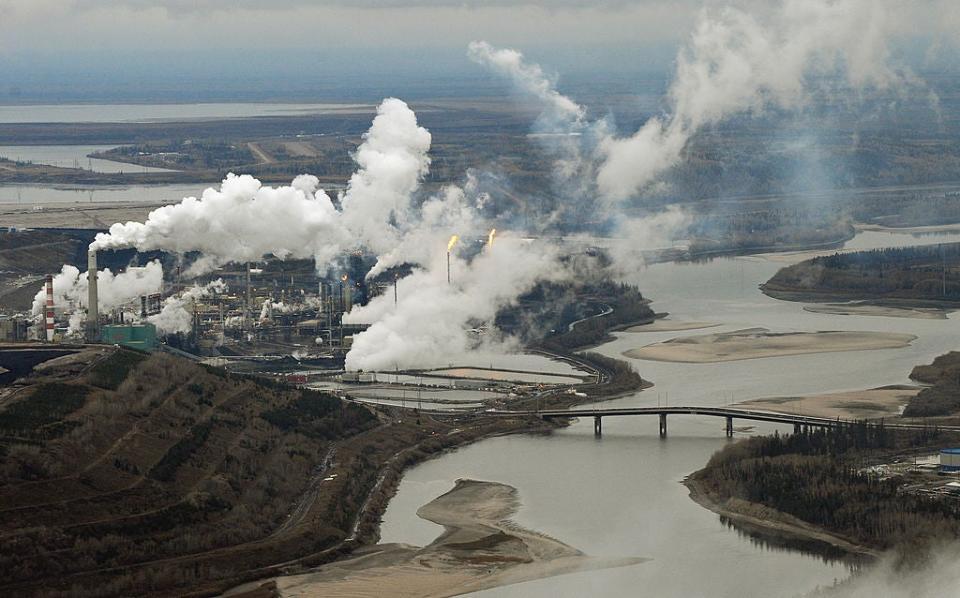UK puts Canadian oil executive on Cop26 ‘climate champions’ list

The UK has placed an oil executive, and a vice president at one of the world’s largest fossil-fuel funding banks, on a list of “climate champions” in the build-up to hosting Cop26 later this year.
The names of “Canadian climate champions” were released by the British government as it marked six months until the international summit in Glasgow. The climate talks are seen as a crucial milestone in the global transition from fossil fuels needed to avoid climate catastrophe.
“The UK and Canada are proud to celebrate the many exceptional individuals that work tirelessly towards achieving net-zero,” a statement from the British High Commission in Canada and the Canada Climate Law Initiative read on 4 May.
Among the 26 climate champions selected were Martha Hall Findlay, chief sustainability officer at Suncor Energy, and Valerie Chort, vice president of corporate citizenship and sustainability at the Royal Bank of Canada.
Ms Hall Findlay oversees Suncor’s sustainability strategy. “Suncor fully supports Canada’s Paris Agreement commitments, and we look forward to COP26 to continue building the all-important collaboration among the private sector, governments and other organisations needed to find real solutions. While the Paris Agreement is among nations, businesses must also be fully engaged,” her statement read.
Suncor, valued at $88.7bn, has promised to reduce emissions from its oil and petroleum production by 30 per cent this decade, and is developing a clean hydrogen project in Alberta province.
But its oil sands mining operations, which produce crude oil from the vast black tar sands of Alberta, are booming.
“Our oil sands operations are the focus of Suncor’s business,” the company website states. In a project north of Fort McMurray, the company wrote that “the mine life is expected to be in excess of 50 years at current planned production rates” of 194,000 barrels per day.
Tar sands development has been met with large protests. Environmentalists say extracting the oil requires huge amounts of energy and water, causes 10 per cent of Canada’s greenhouse gas emissions, and threatens oceans and rivers with spills, and forests with massive open pit mines.
A growing number of First Nations communities in Canada oppose tar sands projects, with the Indigenous Environmental Network linking the oil production to rising cancer rates and wildlife extinction.
Environmentalists questioned the inclusion of an oil company representative on the UK Cop26 list. Among the others lauded are Dr David Suzuki, an environmental activist and scientist who co-founded his eponymous non-profit 30 years ago; and Indigenous climate leaders Melina Laboucan-Massimo, a member of the Lubicon Cree, and Natan Obed, president of Inuit Tapiriit Kanatami, the national organisation representing Inuit in Canada.
Keith Stewart, from Greenpeace Canada, told The Independent: “Climate leaders don’t sell or finance tar sands. We should be celebrating Indigenous land and water defenders, not fossil fuel executives.”
Anthony Swift, Canada Project Director for the Natural Resources Defense Council, told The Independent: “The urgency of this moment requires true climate leadership – and that means taking every effort available to transition from fossil fuels. Suncor’s plan to reduce the incremental emissions of its oil and gas production while pursuing further expansion is a recipe for climate failure that should simply not be rewarded.”
On May 4, while the British High Commission in Ottawa hosted a livestream event to celebrate the climate champions, Suncor was bidding to renew a permit for a fuel refinery in Denver, Colorado, which has been accused by residents of releasing dangerous pollutants which “periodically have coated surrounding neighbourhoods in ash-like material”, as The Colorado Sun noted.
Suncor CEO Mark Little is on the board of the Canadian Association of Petroleum Producers (CAPP) which has opposed climate policy and lobbied to weaken the country’s carbon tax on Big Oil, according to Climate Home News, who first reported the list.
Ms Chort is behind the “integrated climate strategy” towards a low-carbon future at the Royal Bank of Canada (RBC). “With the impacts of climate change permeating all communities and sectors of the economy, there has never been greater opportunity or urgency for leadership, collaboration, ingenuity, and action to achieve a just transition to net-zero,” she said in a statement.
According to Rainforest Action Network’s (RAN) 2021 report “Banking on Climate Chaos”, RBC has pumped $160bn into the fossil fuel industry since the 2015 Paris Agreement, where nations pledged to curb global temperature rise to 1.5C. The report found that RBC is the fifth largest fossil-financing bank in the world.
The RAN report also noted that tar sands oil financing between 2016 and 2020 “was dominated by the Canadian banks” led by RBC, TD and JPMorgan Chase.
In February RBC committed to “net-zero emissions in its lending by 2050”.
Prime Minister Justin Trudeau has set a goal of net-zero emissions for Canada by 2050.
The UK’s Foreign, Commonwealth & Development Office and the Canada Climate Law Initiative did not respond to requests for comment from The Independent.
Read More
Restoring UK’s peatlands, forests and grasslands ‘vital’ for tackling climate crisis, report says
First large offshore US wind farm near Martha’s Vineyard approved by Biden administration
Queen’s Speech climate measures ‘missed opportunity to show world leadership’

 Yahoo Finance
Yahoo Finance 